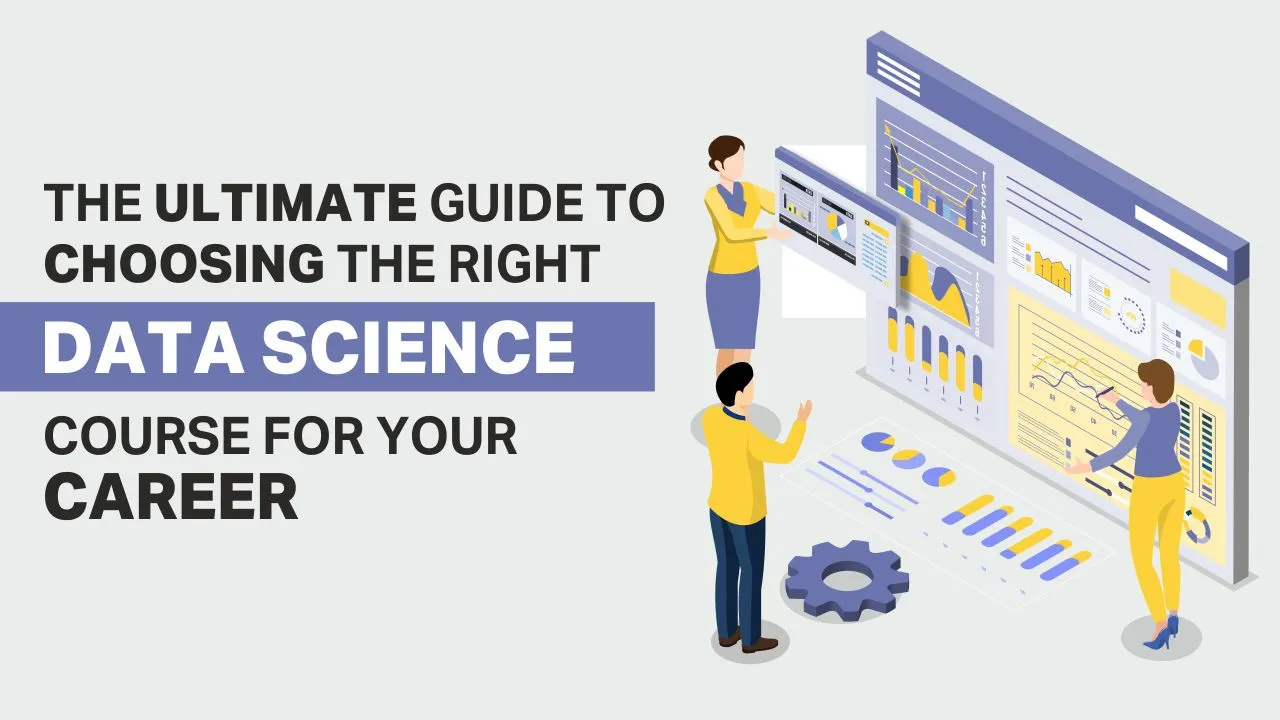
The Ultimate Guide to Choosing the Right Data Science Course for Your Career
Ultimate Guide to Choosing the Right Data Science Course for Your Career: In the era of big data and rapid technological advancements, data science course has emerged as a transformative field that has revolutionized various industries. Harnessing the power of data science enables organizations to make data-driven decisions, uncover valuable insights, and drive innovation.
Whether you’re a budding data enthusiast or a seasoned professional looking to enhance your skills, enrolling in a data science course can be the key to unlocking a world of opportunities. In this comprehensive guide, we will delve into the realm of data science courses.
Data Science: A Gateway to Unparalleled Insights
A. Understanding Data Science
Data science is a multidisciplinary field that combines techniques from statistics, mathematics, computer science, and domain expertise. It extracts knowledge and insights from raw data. It also involves data collection, cleaning, analysis, and interpretation to reveal patterns and trends. It helps in correlations that drive informed decision-making.
B. The Significance of Data Science
Data science plays a pivotal role in numerous domains, including:
- Business: Unearthing customer preferences, optimizing marketing strategies, and enhancing overall operational efficiency.
- Healthcare: Predictive analytics, personalized medicine, and drug discovery to revolutionize patient care.
- Finance: Risk assessment, fraud detection, and algorithmic trading to optimize financial processes.
- Education: Personalized learning experiences and performance analysis for students and educators.
- Government: Data-driven policy-making and social impact analysis to enhance public services.
Statistics for Data Science: The Bedrock of Analysis
A. The Role of Statistics
Statistics is the foundation of data science, providing methodologies for data analysis, inference, and decision-making. Some key applications of statistics in data science include:
- Descriptive Statistics: Summarizing and visualizing data to gain initial insights and understand patterns.
- Inferential Statistics: Making predictions and concluding populations based on sample data.
- Hypothesis Testing: Validating assumptions and drawing inferences about relationships within data.
- Regression Analysis: Modeling relationships between variables to make predictions and identify correlations.
- Time Series Analysis: Analyzing temporal data to identify trends, and seasonality, and forecast future values.
B. Probability and its Significance
Probability is a fundamental concept in statistics and data science. It enables data scientists to quantify uncertainty and make probabilistic predictions. Concepts like conditional probability, Bayes’ theorem, and probability distributions play a vital role in machine learning algorithms and decision-making processes.
Coursera: A Hub for Data Science Courses
a. Introducing Coursera
Coursera is a leading online learning platform that collaborates with top universities and industry experts to offer a diverse range of courses. Coursera has gained widespread popularity among learners worldwide due to its user-friendly interface, flexible learning options, and accreditation from reputable institutions.
b. Coursera Data Science Courses
Coursera boasts a vast selection of data science courses catering to learners of all levels, from beginners to advanced professionals. Some highly regarded data science courses on Coursera include:
- Data Science Specialization by Johns Hopkins University: A comprehensive program covering data manipulation, data visualization, and machine learning using R programming.
- Applied Data Science with Python Specialization by the University of Michigan: An in-depth course focusing on Python for data analysis, data visualization, and machine learning.
- Machine Learning by Stanford University: A fundamental course in machine learning, covering algorithms, model evaluation, and real-world applications.
c. Key Features of Coursera Data Science Courses
- Expert Instruction: Coursera collaborates with renowned instructors and industry experts to provide high-quality, up-to-date content.
- Hands-on Projects: Many data science courses on Coursera include practical assignments and projects to reinforce learning.
- Flexible Learning: Coursera allows learners to study at their own pace, accommodating busy schedules and individual preferences.
- Certification: Upon completion, learners can earn certificates to showcase their skills and knowledge to potential employers.
Advantages of Pursuing a Data Science Course on Coursera
a. Global Reach and Accessibility
Coursera’s online platform breaks down geographical barriers, allowing learners from all corners of the world to access top-quality education in data science.
b. Self-Paced Learning
The self-paced nature of Coursera courses enables learners to manage their study schedules, making it ideal for working professionals and students.
c. Interdisciplinary Approach
Coursera’s data science courses provide a holistic understanding of data science, encompassing statistics, programming, machine learning, and data visualization.
d. Industry-Relevant Content
Coursera’s data science courses are regularly updated to reflect the latest trends and advancements in the field, ensuring learners acquire relevant skills.
e. Supportive Learning Community
Coursera’s online forums and discussion boards facilitate interaction with peers and instructors, fostering a supportive learning community.
Career Opportunities in Data Science
a. Data Scientist
Data scientists play a pivotal role in extracting valuable insights from data, developing machine learning models, and driving data-driven decision-making in organizations.
b. Data Analyst
Data analysts are responsible for collecting, processing, and interpreting data to provide meaningful insights and support business strategies.
c. Machine Learning Engineer
Machine learning engineers design, develop, and deploy machine learning models to solve complex problems and automate processes.
d. Business Intelligence Analyst
Business intelligence analysts use data to create reports and dashboards, empowering organizations to make informed decisions.
e. Data Engineer
Data engineers are responsible for designing and maintaining data infrastructure and pipelines to ensure efficient data processing.
Conclusion
Data science is at the forefront of the technological revolution, and its potential to drive innovation and decision-making across industries is unparalleled. By enrolling in a data science course, aspiring data scientists and professionals can equip themselves with the necessary skills to excel in this exciting field.
Also Read: The Best Way to Learn Data Science
Recent Post
